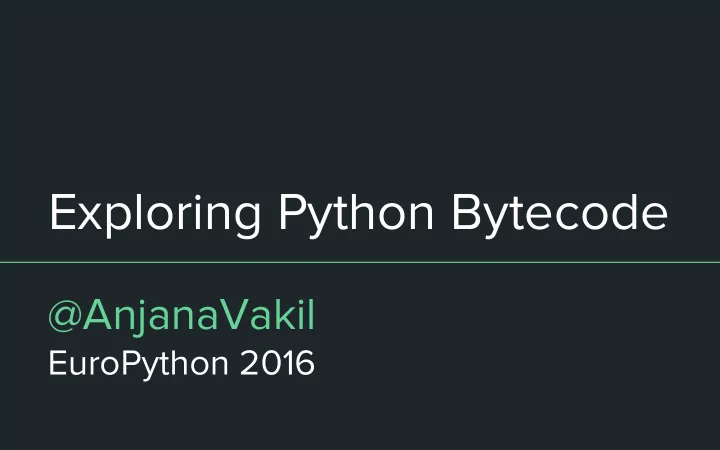

Exploring Python Bytecode @AnjanaVakil EuroPython 2016
Hi! I’m Anjana, and I’m a Pythoholic The Recurse Center
a Python puzzle... 1 # outside_fn.py 1 # inside_fn.py 2 for i in range(10**8): 2 def run_loop(): 3 i 3 for i in range(10**8): 4 i 5 6 run_loop() $ time python3 outside_fn.py $ time python3 inside_fn.py real 0m9.185s real 0m5.738s user 0m9.104s user 0m5.634s sys 0m0.048s sys 0m0.055s http://stackoverflow.com/questions/11241523/why-does-python-code-run-faster-in-a-function
What happens when you run Python code?
What happens when you run Python code? * with CPython
source code compiler => parse tree > abstract syntax tree > control flow graph => bytecode interpreter virtual machine performs operations on a stack of objects the awesome stuff your program does
What is bytecode?
an intermediate representation of your program
what the interpreter “sees” when it runs your program
machine code for a virtual machine (the interpreter)
a series of instructions for stack operations
cached as .pyc files
How can we read it?
dis : bytecode disassembler https://docs.python.org/library/dis.html >>> def hello(): ... return "Kaixo!" ... >>> import dis >>> dis.dis(hello) 2 0 LOAD_CONST 1 ('Kaixo!') 3 RETURN_VALUE
What does it all mean?
operation name argument value line # arg. index offset 2 0 LOAD_CONST 1 ('Kaixo!') instruction
sample operations https://docs.python.org/library/dis.html#python-bytecode-instructions LOAD_CONST( c ) pushes c onto top of stack (TOS) pops & adds top 2 items, result becomes TOS BINARY_ADD calls function with arguments from stack CALL_FUNCTION( a ) a indicates # of positional & keyword args >>> dis.opmap['BINARY_ADD'] # => 23 >>> dis.opname[23] # => 'BINARY_ADD'
What can we dis ?
functions >>> def add(spam, eggs): ... return spam + eggs ... >>> dis.dis(add) 2 0 LOAD_FAST 0 (spam) 3 LOAD_FAST 1 (eggs) 6 BINARY_ADD 7 RETURN_VALUE
classes >>> class Parrot: ... def __init__(self): ... self.kind = "Norwegian Blue" ... def is_dead(self): ... return True ... >>>
classes >>> dis.dis(Parrot) Disassembly of __init__: 3 0 LOAD_CONST 1 ('Norwegian Blue') 3 LOAD_FAST 0 (self) 6 STORE_ATTR 0 (kind) 9 LOAD_CONST 0 (None) 12 RETURN_VALUE Disassembly of is_dead: 5 0 LOAD_GLOBAL 0 (True) 3 RETURN_VALUE
code strings (3.2+) >>> dis.dis("spam, eggs = 'spam', 'eggs'") 1 0 LOAD_CONST 3 (('spam', 'eggs')) 3 UNPACK_SEQUENCE 2 6 STORE_NAME 0 (spam) 9 STORE_NAME 1 (eggs) 12 LOAD_CONST 2 (None) 15 RETURN_VALUE
modules $ echo $'print("Ni!")' > knights.py $ python3 -m dis knights.py 1 0 LOAD_NAME 0 (print) 3 LOAD_CONST 0 ('Ni!') 6 CALL_FUNCTION 1 (1 positional, 0 keyword pair) 9 POP_TOP 10 LOAD_CONST 1 (None) 13 RETURN_VALUE
modules (3.2+) 1 # knights.py 2 print("Ni!") >>> dis.dis(open('knights.py').read()) 1 0 LOAD_NAME 0 (print) 3 LOAD_CONST 0 ('Ni!') 6 CALL_FUNCTION 1 (1 positional, 0 keyword pair) 9 RETURN_VALUE
modules 1 # knights.py 2 print("Ni!") 3 def is_flesh_wound(): 4 return True >>> import knights Ni! >>> dis.dis(knights) Disassembly of is_flesh_wound: 3 0 LOAD_CONST 1 (True) 3 RETURN_VALUE
nothing! (last traceback) >>> print(spam) Traceback (most recent call last): File "<stdin>", line 1, in <module> NameError: name 'spam' is not defined >>> dis.dis() 1 0 LOAD_NAME 0 (print) --> 3 LOAD_NAME 1 (spam) 6 CALL_FUNCTION 1 (1 positional, 0 keyword pair) 9 PRINT_EXPR 10 LOAD_CONST 0 (None) 13 RETURN_VALUE
Why do we care?
debugging >>> ham/eggs + ham/spam # => ZeroDivisionError: eggs or spam? >>> dis.dis() 1 0 LOAD_NAME 0 (ham) 3 LOAD_NAME 1 (eggs) 6 BINARY_TRUE_DIVIDE # OK here... 7 LOAD_NAME 0 (ham) 10 LOAD_NAME 2 (spam) --> 13 BINARY_TRUE_DIVIDE # error here! 14 BINARY_ADD 15 PRINT_EXPR 16 LOAD_CONST 0 (None) 19 RETURN_VALUE
solving puzzles! 1 # outside_fn.py 1 # inside_fn.py 2 for i in range(10**8): 2 def run_loop(): 3 i 3 for i in range(10**8): 4 i 5 6 run_loop() $ time python3 outside_fn.py $ time python3 inside_fn.py real 0m9.185s real 0m5.738s user 0m9.104s user 0m5.634s sys 0m0.048s sys 0m0.055s http://stackoverflow.com/questions/11241523/why-does-python-code-run-faster-in-a-function
>>> outside = open('outside_fn.py').read() >>> dis.dis(outside) 2 0 SETUP_LOOP 24 (to 27) 3 LOAD_NAME 0 (range) 6 LOAD_CONST 3 (100000000) 9 CALL_FUNCTION 1 (1 positional, 0 keyword pair) 12 GET_ITER >> 13 FOR_ITER 10 (to 26) 16 STORE_NAME 1 (i) 3 19 LOAD_NAME 1 (i) 22 POP_TOP 23 JUMP_ABSOLUTE 13 >> 26 POP_BLOCK >> 27 LOAD_CONST 2 (None) 30 RETURN_VALUE
>>> from inside_fn import run_loop as inside >>> dis.dis(inside) 3 0 SETUP_LOOP 24 (to 27) 3 LOAD_GLOBAL 0 (range) 6 LOAD_CONST 3 (100000000) 9 CALL_FUNCTION 1 (1 positional, 0 keyword pair) 12 GET_ITER >> 13 FOR_ITER 10 (to 26) 16 STORE_FAST 0 (i) 4 19 LOAD_FAST 0 (i) 22 POP_TOP 23 JUMP_ABSOLUTE 13 >> 26 POP_BLOCK >> 27 LOAD_CONST 0 (None) 30 RETURN_VALUE
let’s investigate... https://docs.python.org/3/library/dis.html#python-bytecode-instructions STORE_NAME( namei ) Implements name = TOS . namei is the index of name in the attribute co_names of the code object. LOAD_NAME( namei ) Pushes the value associated with co_names[namei] onto the stack. STORE_FAST( var_num ) Stores TOS into the local co_varnames[var_num]. LOAD_FAST( var_num ) Pushes a reference to the local co_varnames[var_num] onto the stack.
Want to dig deeper?
ceval.c : the heart of the beast https://hg.python.org/cpython/file/tip/Python/ceval.c#l1358 A. Kaptur: “A 1500 (!!) line switch statement powers your Python” http://akaptur.com/talks/ ● LOAD_FAST ( #l1368 ) is ~ 10 lines, involves fast locals lookup ● LOAD_NAME ( #l2353 ) is ~ 50 lines, involves slow dict lookup ● prediction ( #l1000 ) makes FOR_ITER + STORE_FAST even faster More on SO: Why does Python code run faster in a function? http://stackoverflow.com/questions/11241523/why-does-python-code-run-faster-in-a-function
Resources: Thanks to: Python Module Of The Week: dis Alice Duarte Scarpa, Andy Liang, https://pymotw.com/2/dis/ Allison Kaptur, John J. Workman, Darius Bacon, Andrew Desharnais, Allison Kaptur: Fun with dis John Hergenroeder, John Xia, http://akaptur.com/blog/2013/08/14/python-bytecode-fun-with-dis/ Sher Minn Chong Yaniv Aknin: Python Innards ...and the rest of the Recursers! https://tech.blog.aknin.name/category/my-projects/pythons-innards/ Python data model: code objects EuroPython https://docs.python.org/3/reference/datamodel.html#index-54 Outreachy Eli Bendersky: Python ASTs http://eli.thegreenplace.net/2009/11/28/python-internals-working- with-python-asts/
Thank you! @AnjanaVakil vakila.github.io
Recommend
More recommend